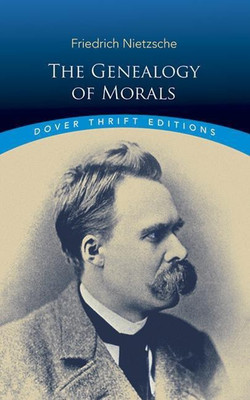The Genealogy of Morals(English, Paperback, Nietzsche Friedrich Wilhelm)
Quick Overview
Product Price Comparison
The Genealogy Of Morals is a collection of three critical essays written by Friedrich Nietzsche, which critique and question the way moral judgements are made using the genealogical method. Summary Of The Book The Genealogy Of Morals is a classic text on ethics. It addresses issues related to ethics and morality, particularly morality between a slave and his master, modern manŌĆÖs moral practices, the evolution of bad conscience and feelings of culpability, and how puritanical ideals maintain life under specific conditions. In the first paper titled, ŌĆ£Good and Evil,ŌĆÖ Good and BadŌĆØ, Nietzsche draws a contrast between slave morality and master morality. According to the author, master morality is developed by individuals who see themselves as free, strong, and healthy, and therefore see their happiness as good. On the other hand, slave morality is developed by those who are unhealthy, enslaved, or weak. These oppressed slaves see their masters as evil, and call themselves good. The second paper is titled, ŌĆ£Guilt, Bad Conscience, and the likeŌĆØ. Here, the author examines the origins of punishment and guilt, stating that they were originally not based on moral transgressions. Instead, guilt meant that an individual owed a debt, and punishment was a way of securing payment. As slave morality grew, guilt and punishment took on their current meanings. Nietzsche further claims that bad conscience or seeing oneself as a sinner has its origins during the development of modern society, where animal instincts were inhibited and encouraged to turn inward. In the final paper titled, ŌĆ£What is the meaning of ascetic ideals?ŌĆØ, Nietzsche confronts asceticism. The author sees this as an expression of sick will. He claims that sick will sees its earthly nature as horrible and sinful, and is unable to free itself from such thoughts. Therefore, it tries to tame itself. The Genealogy Of Morals was first published in 1887. About Friedrich Wilhelm Nietzsche Friedrich Wilhelm Nietzsche was a German poet, philosopher, critic, and philologist. He authored numerous texts on the issues of morality, God, and good versus evil. Some of these titles are The Will To Power, Beyond Good And Evil, and The Anti-Christ. At the age of 24, Nietzsche taught classical philology at the University of Basel. He also briefly served as a medical orderly with the Prussian army during the Franco-Prussian war of 1870-1871. During his lifetime, Nietzsche suffered through several medical ailments, which forced him to take up early retirement. Nietzsche pursued his life as independent philosopher, during which time he wrote The Will To Power and The Genealogy Of Morals. He passed away in August of 1900.


